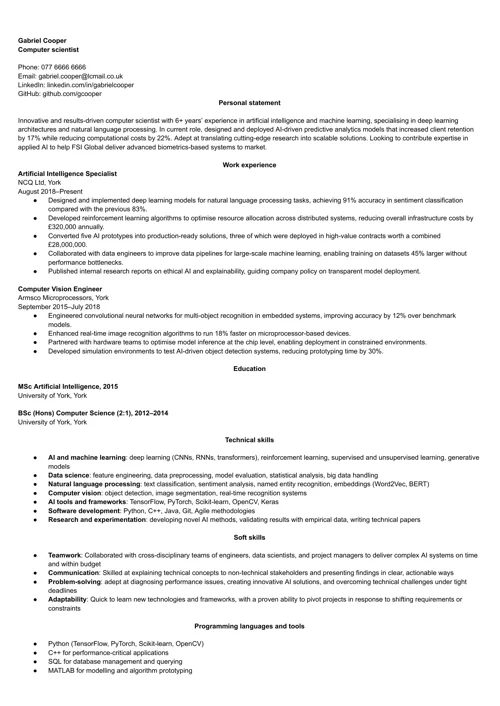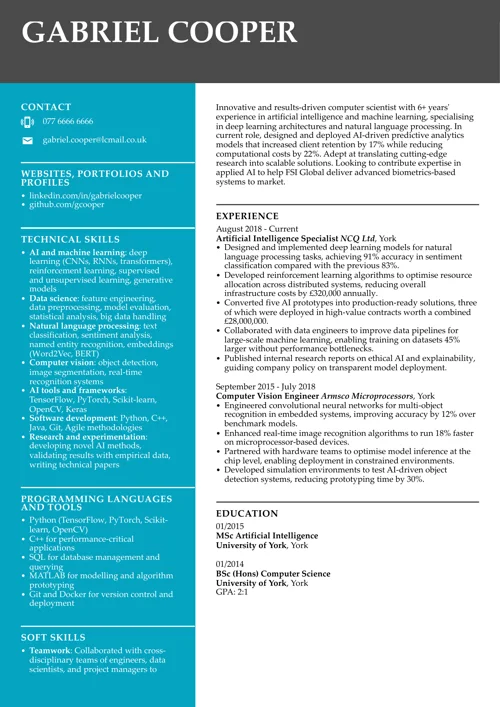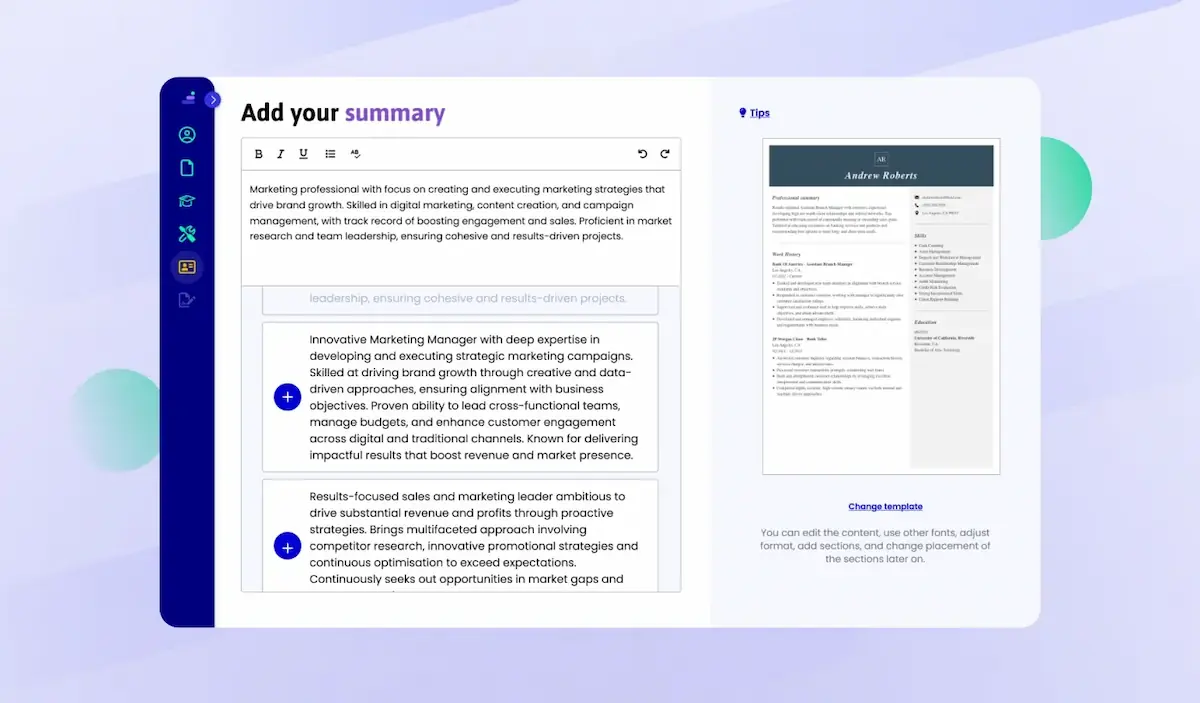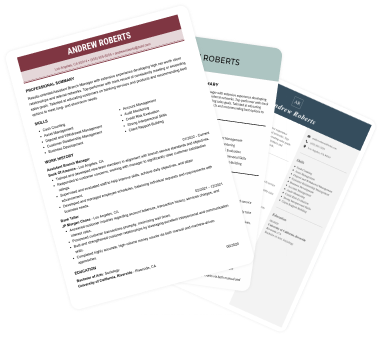Create a professional CV now!
 NO
NO YES
YESLast updated on 12 January, 2026

Whether you’re an aspiring data scientist, a seasoned developer, or simply someone eager to explore the possibilities of AI, the right skills can help you stand out as a professional and aspire to a satisfying career in AI-related fields.
In this guide, I’ll show you the essential AI skills you need to thrive in technologically modern work environments, whether you already have some technical experience or are starting from scratch.
Create an effective CV in minutes. Choose a professional CV template and fill in every section of your CV in a flash using ready-made content and expert tips.
Create a professional CV now!
 NO
NO YES
YESWe created the sample on the left using our builder. See other good CV examples like this one.
Want to explore other AI CV and career guides? View the list below:
AI skills refer to the capabilities and knowledge needed to develop and implement artificial intelligence technologies successfully. These skills are crucial for AI professionals, including data scientists, machine learning engineers, and AI researchers, as well as those working in AI-related fields.
Let’s have a look at the 10 most important AI skills that can help you land a promising job in fields that heavily rely on AI:
Technical expertise is the core of any job that leverages AI. Technical skills involve the tools, languages, and methodologies that allow you to utilise AI and develop artificial intelligence systems.
Below, you’ll find the most common technical skills strongly associated with AI:
Programming is one of the fundamental skills for AI professionals. Being proficient in programming languages like Python, R, and Java enables you to build AI models, develop algorithms, and process large datasets.
Python is particularly popular due to its rich ecosystem of libraries, such as TensorFlow, Keras, and PyTorch, that simplify the development of machine learning and deep learning models. To effectively automate tasks, develop custom AI solutions, and troubleshoot complex systems, you need to understand fundamental programming principles.
Machine learning is at the heart of AI, enabling machines to learn from data and make decisions without explicit programming. It involves developing algorithms that can identify patterns and make predictions or decisions based on data inputs.
Within machine learning, you can find areas such as supervised learning, unsupervised learning, and reinforcement learning. If you master these techniques, you’ll be able to work on a wide range of AI applications, from recommendation systems to predictive analytics. Knowing frameworks such as Scikit-learn or XGBoost will help you implement algorithms effectively.
Deep learning takes machine learning to the next level. Are you ready to develop systems that learn like the human brain? These kinds of models are especially effective for tasks that involve large amounts of unstructured data, such as images, audio, and text.
If you’re familiar with Convolutional Neural Networks and Recurrent Neural Networks, you’re well on your way. These skills are crucial for developing advanced AI models in fields such as computer vision, natural language processing, and speech recognition.
Do you know how to turn data into insights? In AI, data is everything. If you can analyse and preprocess raw data to extract valuable insights, you already have a good starting point in AI.
Data analysis is inevitable for cleaning, transforming, and visualising data to make it suitable for AI model training. With tools like Pandas, NumPy, and visualisation libraries like Matplotlib or Seaborn, you’ll be able to prepare data in ways that drive more accurate predictions and smarter AI models. Strong data analysis skills help you better understand your datasets and improve your AI systems’ performance.
AI typically requires large amounts of data and computing power. Popular computing platforms include AWS, Google Cloud, and Microsoft Azure that provide the infrastructure you need to scale your AI projects. Whether it’s hosting large datasets, deploying models, or collaborating with teams across the globe, cloud computing allows you to work with AI on a much larger scale.
A strong CV summary will convince the recruiter you’re the perfect candidate. Save time and choose a ready-made personal statement written by career experts and adjust it to your needs in the LiveCareer CV builder.

While technical skills are commonly known as the most important for any AI work, soft skills are what enable you to work effectively within teams, solve challenging problems, and communicate your ideas clearly and understandably. Soft skills perfectly complement technical abilities, enabling you to handle the complexity of AI projects effectively.
Let’s see some examples of soft skills for AI:
In AI, you’ll often face complex challenges, but if you can think critically, you’ll tackle them easier. Critical thinking in an AI-related role typically involves analysing data, considering multiple approaches, and making decisions based on logic and evidence rather than assumptions.
Whether you’re designing a machine learning model, assessing results, or planning next steps, the ability to think critically is crucial to creating effective AI systems. Thanks to that, you can ask the right questions, identify biases, and devise innovative solutions.
Problem-solving is key for AI professionals because you’ll be tasked with finding new ways to apply AI to real problems. This might be troubleshooting a bug, improving model accuracy, or optimising system performance. And with excellent problem-solving skills, you’re about to overcome challenges that arise in AI projects. Those who think strategically and find creative solutions truly stand out in the field.
AI models and algorithms can be really complicated, so you must know how to explain them in a way that everyone can understand. Communication skills are key to presenting complex AI concepts in a way that they’re easy to understand. This is especially important when working with stakeholders, non-technical individuals, or clients who may not be familiar with AI. You’ll use them to explain how algorithms work, discuss their potential impact, or give a status update on an AI project.
Many AI projects require close collaboration between data scientists, engineers, business stakeholders, and designers. Are you a team player with excellent teamwork skills who can work well in cross-functional environments? In AI, effective collaboration helps solve complex problems using different perspectives and skill sets. Being able to work closely with others, communicate effectively across disciplines, and integrate various areas of expertise guarantees the success of AI projects.
Prompt engineering is a modern skill that enables creating effective prompts and getting the most out of AI and its capabilities. To develop effective prompts, you need to understand how AI systems interpret language and how to craft inputs that lead to the desired outcome. Whether you’re working with a chatbot, a language model, or any other AI-driven system, being able to optimise prompts is a critical skill to improve AI performance and efficiency.
If you’re choosing AI skills to learn, start by building a solid foundation in the core concepts of AI. These are machine learning, neural networks, and natural language processing. If you’re a beginner, consider online courses, textbooks, and tutorials as valuable resources. Once you have mastered the basics, you can focus on hands-on practice. Work on real projects, whether through coding exercises, AI competitions like Kaggle, or contributing to open-source AI projects.
If you’re already skilled in AI but want to take your expertise and skills to the next level, consider deepening your knowledge in areas such as reinforcement learning, generative models, and explainable AI. You may attend specialised conferences and read the latest articles to stay ahead. To refine your skills further, you can also work on large-scale, complex projects that challenge your technical abilities.
You don’t have to be a CV writing expert. In the LiveCareer CV builder you’ll find ready-made content for every industry and position, which you can then add with a single click.

As a final note, remember that developing AI skills isn’t just about keeping up with technology. You also need to stay curious, adaptable, and ready to implement new, innovative ideas. Good luck with growing your AI skills!
Our editorial team has reviewed this article for compliance with Livecareer’s editorial guidelines. It’s to ensure that our expert advice and recommendations are consistent across all our career guides and align with current CV and cover letter writing standards and trends. We’re trusted by over 10 million job seekers, supporting them on their way to finding their dream job. Each article is preceded by research and scrutiny to ensure our content responds to current market trends and demand.
Category: CV Help
Crafting a job-winning CV is all about showcasing your unique skills and experiences. Start with a strong personal statement that highlights your career goals and achievements.
Try Our CV Builder Now